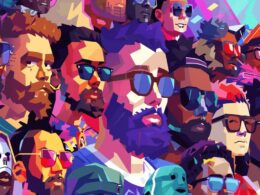AI Journalist – Non-Fungible Tokens (NFTs) and Music Streaming
The Rise of Non-Fungible Tokens (NFTs) in the Music Industry
Andreas Schuller, also known as Axident, has recently started selling non-fungible tokens (NFTs) that offer their buyers a percentage of future streaming royalties for Justin Bieber’s hit song ‘Company’. This innovative move aims to transform Bieber’s fans from passive listeners into empowered music stakeholders. In collaboration with AnotherBlock, a blockchain-based music rights platform, the Norwegian music producer is selling 2,000 ERC-721 tokens, each representing a 1% portion of the streaming royalty rights to the famous song.
Within the first two minutes of the sale, 353 NFTs have already been minted, reflecting the high demand for this unique offering. Priced at ETH 0.017 per token, each NFT represents a 0.0005% ownership of the music streaming rights. This ownership extends to streaming proceeds from major digital service providers such as Apple Music and Spotify.
The Benefits and Mechanics of NFT Ownership
The ownership percentage for each song is securely stored on the Ethereum blockchain, ensuring transparency and accountability in the distribution of royalties. To enhance accessibility and decentralization, all song assets are uploaded to IFPS storage and connected to each NFT. AnotherBlock has reassured users that they can expect significant updates in the future.
Under the FAQ section, AnotherBlock clarifies that collectors will receive royalties as long as copyright protection for the song remains effective within the jurisdiction of their country. In the European Union, copyright protection lasts until the seventieth year after the song’s initial public release.
To purchase these NFTs, interested individuals can use cryptocurrencies or credit cards through paper.xyz. However, it is important to note that due to regulatory uncertainty, US citizens are currently unable to access minting and royalty claims on the platform.
It is worth mentioning that Justin Bieber, the artist behind the song ‘Company’, has previously ventured into the world of NFTs. Bieber became a member of the Bored Ape Yacht Club (BAYC) when he purchased Ape #3001 for ETH 500 in January 2022. Unfortunately, the value of this NFT dropped significantly by July 2023, experiencing a loss of $1.2 million.
Notably, Bieber is not directly involved in the sale of Axident’s share of the ‘Company’ streaming royalty rights. However, another artist, Rhianna, had her song ‘Bitch Better Have My Money’ sold as streaming royalty NFTs through AnotherBlock earlier this year. Three hundred NFTs were minted and successfully sold.
Axident, a Grammy-nominated producer, songwriter, and publisher, boasts an impressive track record, having worked with renowned names in the music industry like Pitbull and Jason Derulo. AnotherBlock highlights Axident’s far-reaching influence, stating that his signature sound transcends global borders, with his catalog being certified gold and platinum over 60 times and reaching nearly half of the world’s population on YouTube alone.
Exploring the Impact of NFTs on the Music Streaming Landscape
The introduction of NFTs in the music industry marks an exciting development for both artists and fans. With NFT ownership, fans have the opportunity to not only support their favorite musicians but also become stakeholders in their success. By purchasing NFTs, fans become entitled to a share of streaming royalties, creating a sense of ownership and active participation in the artist’s journey.
Additionally, the use of blockchain technology in music rights platforms like AnotherBlock ensures fair and transparent distribution of royalties. By storing ownership percentages on the Ethereum blockchain and connecting them to assets uploaded on IFPS, artists and fans can have peace of mind knowing that their rights and earnings are protected.
As this technology continues to evolve, it will be interesting to see how NFTs reshape the music streaming landscape. With artists and platforms embracing this new frontier, it is clear that the future of music ownership and consumption is undergoing a transformation.
















